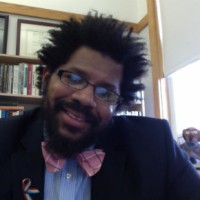What race riots accomplish
Donald Trump, the 2016 law and order candidate, resembles the 1968 presidential candidates George Wallace and Richard Nixon in his aim to bring peace to the streets. Like Wallace and Nixon, Trump interprets law and order through race. While he aims to appeal to the black population by lending an ear to their concerns about “hood” life, he has promised to fight crime with the unconstitutional stop and frisk policy, which systematically profiles black and brown Americans.
Watching the coverage of recent riots unfolding in Milwaukee and Charlotte, I grew angry. Privileged white policy officials responded with complaints that “they” are burning down their own neighborhood, closing local businesses that employ them, and targeting the police force for killing an armed black man who could have brought harm to other black people. It was only a matter of time before Hillary Clinton and Trump offered responses about saving black people from themselves.
These policy analysts failed to ask or answer the real question: why do black people riot? The community space of black Americans does not resemble what Trump calls hell. However, past institutional structures like Jim Crow have left a legacy of marginalization in black communities. Trump and much of white America fails to understand what black churches have clearly articulated: black people take to the streets and riot in order to protest systematic problems in society.
Race riots are not a new phenomenon: they are a natural part of the American genesis. Black folks have rioted since the days of the Stono Rebellion and Nat Turner. Turner, who led the 1831 slave insurrection against white supremacy, was motivated by his faith in God to seek hope, dignity, and freedom for humanity.
Martin Luther King Jr. did not wholly support riots, but he understood why black people riot, as he explained in 1968:
I contend that the cry of ‘black power’ is, at bottom, a reaction to the reluctance of white power to make the kind of changes necessary to make justice a reality for the Negro. I think that we’ve got to see that a riot is the language of the unheard. And, what is it that America has failed to hear? It has failed to hear that the economic plight of the Negro poor has worsened over the last few years.
In the decades since King spoke those words, abuse, discrimination, targeted police brutality, racism, and capitalist injustices have furthered the deep-seated levels of inequality in black communities.
But black people are not the only ones who riot. In the years immediately following World War I, tens of thousands of black southerners and returning black soldiers flocked to the nation’s northern cities looking for employment and a measure of respect and security. Many white Americans, fearful of competition for scarce jobs and housing, responded by attacking black citizens in a spate of urban race riots. Riots in Chicago and Tulsa were driven by white fear and a sense that black folks had failed to stay in their place. (This attitude is similar to fears that Trump has exploited and exacerbated in his campaign.)
In 1919, white mobs in Chicago used baseball bats and iron bars to attack black riders on the trolleys. In 1921, hundreds of white people in Tulsa led an attack on black people, killing some 300 of them with arson, guns, and improvised bombs.
In a Crisis editorial responding to the Chicago riots, W. E. B. Du Bois made the case for armed resistance as a defensive response to acts of violence:
If the United States is to be a Land of Law, we would live humbly and peaceably in it—working, singing, learning and dreaming to make it and ourselves nobler and better: if it is to be a Land of Mobs and Lynchers, we might as well die today as tomorrow.
The end of de jure voter discrimination measures in 1965 only emboldened de facto racism. Often white communities—with the support of white politicians—sought to empower the police to guard their property against “thuggish” black folk. Now we ponder the crisis of mass incarceration.
And we might challenge our presidential candidates to do the same. Will Clinton disavow and actively work against her husband’s role in the policing and incarceration of black people? Will Trump stop promoting the protection of white property through stop-and-frisk policies? How will our next president-elect serve the needs of black people?
Our weekly feature Then and Now harnesses the expertise of American religious historians who care about the cities of God and the cities of humans. It's published in partnership with the Kripke Center of Creighton University and edited by Edward Carson and Beth Shalom Hessel.






